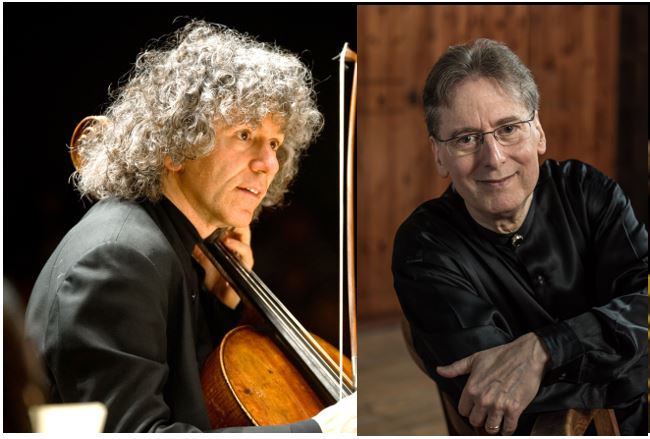A funky fortepiano makes for a challenging night of Beethoven

2020 will be the Year of the Beethoven Cycles, as every classical music institution under the sun offers such surveys in celebration of his 250th birthday.
On Thursday evening, the University of Chicago Presents series got a leg up on their peers, with Steven Isserlis and Robert Levin playing the first of two concerts dedicated to Beethoven’s complete music for cello and keyboard. The series will conclude Friday night at the Logan Center.
Then opening program featured the Cello Sonatas Nos. 1 and 3, the “See the Conqu’ring Hero Comes” and “Ein Mädchen oder Weibchen” variations, and—a real curio—Beethoven’s own transcription of his rarely heard Horn Sonata.
The keyboard in question Thursday was a fortepiano rather than a modern piano. This is de rigeur for Levin, who is equally famous as a player and scholar in the field of historical performance.
Yet Levin’s instrument proved to be the fly in the ointment for mechanical rather than interpretive reasons. The D4 key (the one right above middle C) became stuck, continuing to sound every time it was struck. The concert stalled repeatedly as Levin unsuccessfully attempted repairs between every movement in the first half.
To top it off, Levin stopped partway through the opening movement of the second half, as he discovered that the low F was no longer working. This was just in time for the concert’s first piece in (you guessed it) the key of F.
Levin was a trouper, though, and there were few signs that things were amiss, except for the occasionally audible intrusion of the insistent D note.
Isserlis and Levin recorded all of these Beethoven pieces five years ago, and have been playing them together for even longer. Yet they still remain something of a musical odd couple stylistically.
Isserlis’s playing was filled with matchless enthusiasm, like someone discovering these pieces for the first time. Beethoven plants a lot of surprises in these sonatas: strange harmonic twists and impish syncopations. Isserlis’s assertive articulation made sure that you noticed every little curve ball.
Levin’s approach, on the other hand, was considerably drier and more plain-spun. He matched Isserlis’s drive in the more extroverted moments, and varied tempo artfully when playing on his own. But he lacked Isserlis’s imaginative phrasing, which was surprising in an artist known for his powers of improvisation.
Sometimes the two musicians’ contrasting personalities worked well. When the fortepiano introduced melodies later taken up by the cello, we got to hear a plainer version under Levin’s fingers bloom into a richer version under Isserlis’s bow. But at least once per movement, Isserlis and Levin got noticeably out of time with each other, often due to Levin lingering while Isserlis pushed forward.
Fortunately for a pair who were at their best when the music was at its most rambunctious, the Horn Sonata is the only piece on the program that has a real slow movement. Everything else played to their energetic strengths.
Both variation sets were full of character. In the Handel variations, Isserlis (sonically and physically) danced along to Variation VII, and Levin brought surprising tenderness to the pianissimo section of Variation VIII.
The Sonata No. 1 was the concert’s highlight. The first movement’s Allegro usually opens quietly and gracefully, but Isserlis and Levin had it galloping out of the gates. The end of the exposition was exhilarating, the fortepiano’s bass octaves producing that growl that you don’t get on a modern piano.
The Horn Sonata arrangement is a dud of a piece, but Isserlis and Levin played it with enough conviction to almost overcome this.
The balance of darkness and humor in Sonata No. 3’s Scherzo can be hard to maintain, but they managed that challenge as well. And in keeping with the rest of their performances, the finale rollicked as it should.
Isserlis and Levin will conclude their Beethoven series 7:30 p.m. Friday at the Logan Center. chicagopresents.uchicago.
Posted in Performances





Posted Feb 23, 2019 at 3:09 pm by Chilynne
Yes, the fortepiano was subject to changes in temperature and humidity – as were the instruments of plenty of area musicians this winter (and previous winters AND summers), who have COPED. That said, it’s a very fine instrument. While one sympathizes with Mr. Levin’s frustration, he was unnecessarily ungracious. Fortunately. Friday’s performance was joyous.